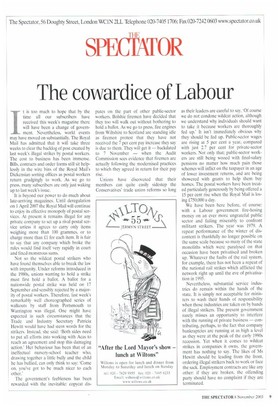The cowardice of Labour
1 t is too much to hope that by the time all our subscribers have received this week's magazine there will have been a change of government. Nevertheless, world events may have moved on substantially. The Royal Mail has admitted that it will take three weeks to clear the backlog of post created by last week's illegal strikes by postal workers. The cost to business has been immense. Bills. contracts and order forms still sit helplessly in the wire bins of the Royal Mail's Dickensian sorting offices as postal workers return grudgingly to work. As we go to press, many subscribers are only just waking up to last week's issue.
It is beyond our power to do much about late-arriving magazines. Until deregulation on 1 April 2007 the Royal Mail will continue to enjoy its effective monopoly of postal services. At present it remains illegal for any private company to set up a rival postal service unless it agrees to carry only items weighing more than 100 grammes, or to charge more than £1 for each item. It is fair to say that any company which broke the rules would find itself very rapidly in court and fined monstrous sums.
Not so the wildcat postal strikers who have found themselves able to break the law with impunity. Under reforms introduced in the 1980s, unions wanting to hold a strike must first hold a ballot. A ballot for a nationwide postal strike was held on 17 September and sensibly rejected by a majority of postal workers. Therefore, last week's remarkably well choreographed series of walkouts by staff from Portsmouth to Warrington was illegal. One might have expected in such circumstances that the Trade and Industry Secretary Patricia Hewitt would have had stern words for the strikers. Instead, she said: 'Both sides need to put all efforts into working with Acas to reach an agreement and stop this damaging action.' Her behaviour has been that of an ineffectual nursery-school teacher who, drawing together a little bully and the child he has bullied, can only think to say: 'Come on, you've got to be much nicer to each other.'
The government's feebleness has been rewarded with the inevitable: copycat dis putes on the part of other public-sector workers. Bolshie firemen have decided that they too will walk out without bothering to hold a ballot. As we go to press, fire engines from Wiltshire to Scotland are standing idle as firemen protest that they have not received the 7 per cent pay increase they say is due to them. They will get it — backdated to 7 November — when the Audit Commission sees evidence that firemen are actually following the modernised practices to which they agreed in return for their pay rise.
Unions have discovered that their members can quite easily sidestep the Conservatives' trade union reforms so long as their leaders are careful to say, 'Of course we do not condone wildcat action, although we understand why individuals should want to take it because workers are thoroughly fed up.' It isn't immediately obvious why they should be fed up. Public-sector wages are rising at 5 per cent a year, compared with just 2.7 per cent for private-sector workers. Not only that; public-sector workers are still being wooed with final-salary pensions no matter how much pain those schemes will inflict on the taxpayer in an age of lower investment returns, and are being showered with grants to help them buy homes. The postal workers have been treated particularly generously by being offered a 15 per cent rise when the Royal Mail is losing £750,000 a day.
We have been here before, of course: with a Labour government fire-hosing money on an ever more ungrateful public sector and failing miserably to confront militant strikers. The year was 1979. A repeat performance of the winter of discontent is thankfully no longer possible on the same scale because so many of the state monoliths which were paralysed on that occasion have been privatised and broken up. Whatever the faults of the rail system, for example, there has not been a repeat of the national rail strikes which afflicted the network right up until the eve of privatisation in 1995.
Nevertheless, substantial service industries do remain within the hands of the state. It is simply not acceptable for ministers to wash their hands of responsibility when those industries are taken on by bands of illegal strikers. The present government rarely misses an opportunity to interfere with the running of private business — contributing, perhaps, to the fact that company bankruptcies are running at as high a level as they were at the peak of the early 1990s recession. Yet when it comes to wildcat strikes in companies it owns, the government has nothing to say. The likes of Ms Hewitt should be leading from the front, ordering illegal strikers back to work or face the sack. Employment contracts are like any other: if they are broken, the offending party should have no complaint if they are terminated.


































































































 Previous page
Previous page